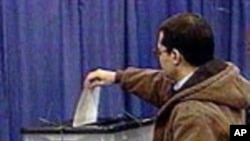<!-- IMAGE -->By passing a much-anticipated election law, Iraq's parliament took another step toward national unity and political stability. It also proved to the international community that Iraq's political process is functioning as it should.
U.S. President Barack Obama congratulated Iraqi leaders on passing the law:
"I want to congratulate Iraq's leaders for reaching this agreement. Their flexibility and commitment to their country sends an important signal to the world about Iraq's democracy and national unity."
The Iraqi constitution mandates that elections be held by the end of January. But first, it was necessary to revise the existing election law, which dates back to the regime of Saddam Hussein, and was deemed by a number of lawmakers to be unsuitable.
One of the more contentious issues resolved by the Iraqi Parliament was how much say the voters would have in who will represent them. The old law required closed lists, which allow voters to choose from a list of political parties. After much debate and dissent, the legislators passed a law that requires open lists, which name candidates and their political parties, and thus give voters a greater voice in who will represent them in Parliament.
The new law is a hard-won compromise. But while it may not be everything that legislators wished for, all political factions promised to be bound by it, and to take part in the election. This is in stark contrast to the election of 2005, which was boycotted by the Sunnis, and resulted in much anger that fueled a violent, two year long insurgency.
Indeed, the passage of this law is "an important milestone as the Iraqi people continue to take responsibility for their future," said President Obama:
"This agreement advances the political progress that can bring lasting peace and unity to Iraq and allow for the orderly and responsible transition of American combat troops out of Iraq by next September."
"Iraq has known many challenges," said President Obama. "And in the past several weeks we have seen that there are still those who would kill innocent men, women and children to deny the Iraqi people the future they deserve. Today's step forward is another reminder that these enemies of the Iraqi people will fail."
U.S. President Barack Obama congratulated Iraqi leaders on passing the law:
"I want to congratulate Iraq's leaders for reaching this agreement. Their flexibility and commitment to their country sends an important signal to the world about Iraq's democracy and national unity."
The Iraqi constitution mandates that elections be held by the end of January. But first, it was necessary to revise the existing election law, which dates back to the regime of Saddam Hussein, and was deemed by a number of lawmakers to be unsuitable.
One of the more contentious issues resolved by the Iraqi Parliament was how much say the voters would have in who will represent them. The old law required closed lists, which allow voters to choose from a list of political parties. After much debate and dissent, the legislators passed a law that requires open lists, which name candidates and their political parties, and thus give voters a greater voice in who will represent them in Parliament.
The new law is a hard-won compromise. But while it may not be everything that legislators wished for, all political factions promised to be bound by it, and to take part in the election. This is in stark contrast to the election of 2005, which was boycotted by the Sunnis, and resulted in much anger that fueled a violent, two year long insurgency.
Indeed, the passage of this law is "an important milestone as the Iraqi people continue to take responsibility for their future," said President Obama:
"This agreement advances the political progress that can bring lasting peace and unity to Iraq and allow for the orderly and responsible transition of American combat troops out of Iraq by next September."
"Iraq has known many challenges," said President Obama. "And in the past several weeks we have seen that there are still those who would kill innocent men, women and children to deny the Iraqi people the future they deserve. Today's step forward is another reminder that these enemies of the Iraqi people will fail."




